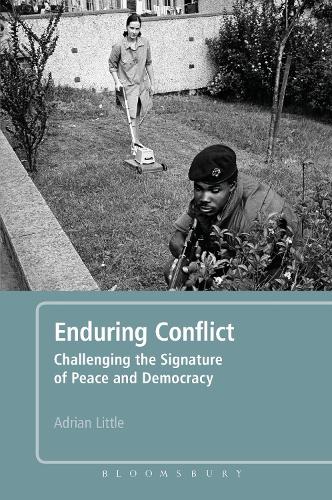
Enduring Conflict: Challenging the Signature of Peace and Democracy
(Paperback)
Available Formats
Publishing Details
Enduring Conflict: Challenging the Signature of Peace and Democracy
By (Author) Dr. Adrian Little
Bloomsbury Publishing PLC
Bloomsbury Academic
10th April 2014
United Kingdom
Classifications
Tertiary Education
Non Fiction
Peace studies and conflict resolution
327.16
Physical Properties
Paperback
176
Width 152mm, Height 229mm
240g
Description
This unique text challenges the notion that absence of conflict is the foundation and norm of a stable political environment. Combining complexity theory and the notion of signature with case studies, it argues that political processes need to be understood within their social and cultural contexts. It thus develops the idea of enduring conflict, referring to both the enduring nature of political conflict and the endurance of people in conflict-ridden societies, looking at countries involved in conflict transformation, such as Northern Ireland, Cambodia, Indonesia, and South Africa. Examining debates around trauma, memory, and reconciliation, the work shows how conflicts are so socially and culturally ingrained and protracted that political agreements alone cannot bring substantive change. In addition, key texts, such as peace agreements, along with interviews of politicians, participants, and NGOs help identify the conditions under which notions like peace, democracy, and conflict resolution can even be conceived - let alone implemented. This innovative text is a significant contribution to the literature as it highlights the limitations of conflict resolution strategies and identifies the issues that pertain to conflicts throughout global politics. Written in an accessible manner, it will be highly attractive to students in conflict processes, peace studies, and international relations theory.
Reviews
"Through his "enduring conflict thesis," Little (Univ. of Melbourne, Australia) sets out to forcefully challenge the assumption endemic in the vast majority of conflict resolution literature: the absence of conflict is not only a preferred condition, but an attainable one. Summing Up: Recommended. Upper-division undergraduate, graduate, research, and professional collections. " --M. O'Gara, Rocky Mountain College
Author Bio
Adrian Little is Professor of Political Theory at the University of Melbourne, Australia, where he has been the Head of the School of Political Sciences since 2007. He is the author of numerous journal articles as well as five books, including The Politics of Radical Democracy (2009).
